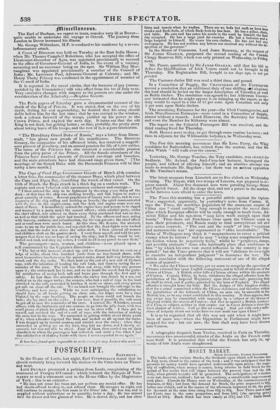The Cape if Good Hope Government Gazette of March 27th
contains a letter from the commander of the steamer Hope, which plied between the Cape and Algoa Bay, describing the wreck of that vessel. On the 11th of March. the Hope struck in a thick fog on a sunken rock. The captain and crew behaved with uncommon coolness and courage— I then ordered the ship to be lightened by throwing every thing off the deck : at this time the ship was striking heavily, and had begun to make a great quantity of water. Several puncheons of brandy were stove, and in con- sequence of the ship rolling and striking so heavily, the spirit communicated with the fires in the engine-room, and the deck and engine-room were one sheet of flame. I immediately ordered the engine-hose and pumpsto be rigged and manned by a party under the second officer ; while another party, under the chief othcer, was ordered to throw every thine.' overboard that was on tire, as well as that which the spirit had touched. By the officers and men acting with bravery, coolness, and subordination, the tire was got out ; the chief officer and several men were much burnt. At this time, Mr. Krauss, the steward, come to me on the paddle-box, and reported that the dead-lights were washed in, and that the water was above the cabin-deck. 1 then ordered all women and children abaft on the quarter-deck. I went there myself, and told the pas- sengers that there was no hope of saving the ship ; but if they would be col- lected and cool, and obey my orders, 1 would do all in my power to save them." The passengers—men, women, and children—were placed upon a raft constructed by the Captain's directions- " The fog at this moment cleared up, :Lod we discovered that we were on a ledge of rocks, about two hundred yarda from an iron-bound shore, with most tremendous breakers over the pointed rocks, about half-way between the wreck and the dry rocks. We then bent on the end of a new coil of 2:1-inch rope, with the intention of hauling the raft back, and thereby saving the re- =under of the crew. The raft was then cut away, with forty-one persons upon it ; the cutter took her in tow, and we on board the wreck had the grate- ful satisfaction of seeing both raft and boats pass through the first surf' in safety. In less than five minutes after, the cutter was struck by a sea, and dashed on to the upper rocks; the seamen, who had a coil of rope in the boat attached to the raft, succeeded in hauling it more on shore and every person got safe on shore off the raft. We on board now brought the raft-rope to the windlass, and hove away. "While we were anticipating the satisfaction we should have in all hands getting on shore safe, our hopes were for a time blighted by the rope breaking. The people on shore could not launch the boat ; she lay stove on the rocks. I saw now, that if possible, the raft must begot off to save the remainder of the crew. 1 ordered Mr. Whitaker, second officer, with the boatswain and one seaman, to go into the jolly-boat, with two small pieces of plank for paddles, and one oar to steer with. I then got in myself, and received the end of a coil of rope, with the intention of making the same fast to the rope. We succeeded in getting within about thirty yards of it ; when a breaker capsized the boat, and dashed us all against the rocks. I was dragged up by several seamen, and carried over the rocks : when they succeeded in getting me on dry land, they laid me down, and I shortly re- covered, but was not able to stand. Four of them then carried me on their shoulders to where the passengers had collected, and made a fire, when I had the satisfaction of shaking bands with those I never expected to see again."


























 Previous page
Previous page